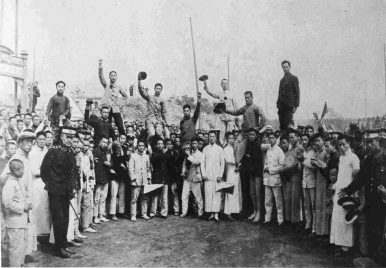By Sebastian Veg
 As China marks the 100th anniversary of the 1919 May Fourth demonstrations, it is certainly a challenge to write anything new about this unanimously celebrated event. May Fourth has been studied and discussed from every imaginable angle and political perspective over the last century. It is no longer the case, as it was when Chow Tse-tsung (1916-2007) published his seminal study around the time of its 40th anniversary in 1959, that scholars are divided over whether to see it as a national renaissance or a national catastrophe. Today it is indiscriminately celebrated by progressives and conservatives – with the possible exception of some die-hard Confucian fundamentalists – the Communist (CCP) and Nationalist (KMT) parties, Chinese people and foreigners. It was even briefly appropriated by advocates of independence in the 2008 presidential campaign in Taiwan. However, such unanimity is only achieved at the price of considerable ambiguity as to what is actually being commemorated.
As China marks the 100th anniversary of the 1919 May Fourth demonstrations, it is certainly a challenge to write anything new about this unanimously celebrated event. May Fourth has been studied and discussed from every imaginable angle and political perspective over the last century. It is no longer the case, as it was when Chow Tse-tsung (1916-2007) published his seminal study around the time of its 40th anniversary in 1959, that scholars are divided over whether to see it as a national renaissance or a national catastrophe. Today it is indiscriminately celebrated by progressives and conservatives – with the possible exception of some die-hard Confucian fundamentalists – the Communist (CCP) and Nationalist (KMT) parties, Chinese people and foreigners. It was even briefly appropriated by advocates of independence in the 2008 presidential campaign in Taiwan. However, such unanimity is only achieved at the price of considerable ambiguity as to what is actually being commemorated.
In recent weeks, some students at Peking University – the institution at the heart of the May Fourth movement – leaked a questionnaire they had been asked to fill out appraising Xi Jinping and the current political situation in China. In a group of questions specifically dedicated to the May Fourth movement, they were prompted to identify May Fourth with patriotism (“the most important part of personal dignity is knowing how to be patriotic”), the need to actively practice it (“patriotism should not be limited to slogans”), and the progressive values of the Chinese people. It has indeed been the CCP’s habit to highlight the patriotic student demonstrations and the worker and shop-owner strikes that took place for roughly one month between May 4 and June 10, 1919, while other aspects of the broader New Culture Movement – which unfolded over the years between 1915 and 1923 – are downplayed.
This selective form of commemoration is particularly ironic at a time when two central aspects of the New Culture – the defense of academic freedom and cosmopolitan enthusiasm for ideas and knowledge from around the world – are being repressed in contemporary China. Xu Zhangrun, a professor at the Law School of Tsinghua University, was suspended from duty and placed under investigation by the university in March 2019 for no other reason than penning a series of editorials criticizing the current government (and there are a number of less prominent but nonetheless well-documented cases of a similar nature). More broadly, following the publication of a State Council “Opinion” in January 2015, the minister of education issued a call to minimize the use of “foreign content” in textbooks and other class material at all levels of the educational system, leading to a gradual phasing out in all but some top tier institutions of the cosmopolitan spirit that has imbued China’s universities for the last decades.
No comments:
Post a Comment